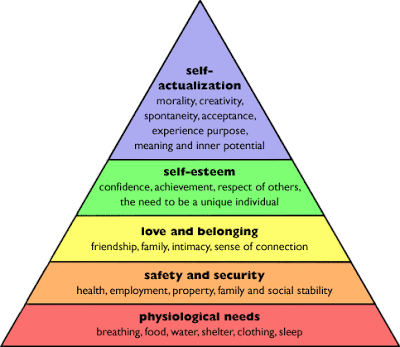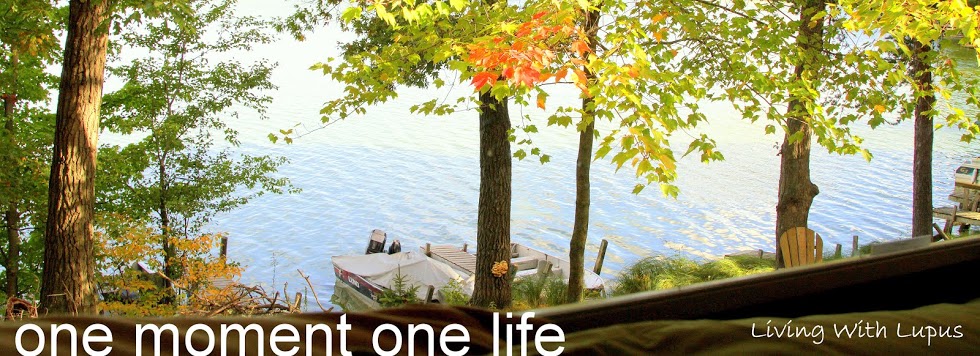Abraham Maslow, (1908-1970) was a professor of psychology at Brandeis University. It was there that he founded humanistic psychology and it was there that he created Maslow's Hierarchy of Needs. His theories of human developmental psychology focus mainly on the stages of psychological growth in humans. Maslow's theory was revealed in his 1954 book
Motivation and Personality. Although still pertinent today, there has been extensive criticisms of the theory. For example, Maslow includes sex in the bottom level, that of physiological needs. It is true that in order for humankind to exist there must be procreation. But many feel this neglects the emotional and familial implications of sex within the setting of community.
Maslow's hierarchy of needs is most recognized in the shape of a pyramid, with the largest and most fundamental needs at the bottom and the less "necessary" need (the need for self-actualization) at the top.

The most fundamental needs (the bottom four) are called "deficiency needs" or "d-needs": esteem, friendship/love, security and physical needs (health). With the exception of the bottom layer, if the d-needs are not met, the body gives no physical indication but the person feels unsettled or anxious. Maslow's theory suggests that the most basic levels of need must be met before a person will desire the secondary or higher level needs, which are called "Being needs" or "b-needs". These are the people that are motivated to go above and beyond the basic needs and strive constantly for growth and enrichment. The desire to be better. These individuals seem to be driven mainly by Being needs instead of deficiency needs. You know the type...the kind of people that get lost in their work or their art and need to be reminded to do basic things like eat and sleep!
So why the brief lesson in psychology? Because it was in my remembering of this simple, yet profound theory, that I found comfort recently. As some of you already know, the past few weeks have been a slow, yet constant spiral down for me health-wise. By this past weekend, our main focus narrowed to just keeping me out of the hospital. After three days at the University of Minnesota Medical Center, the doctors determined that the tapering off of steroids led to a fairly miserable Lupus flare. It took a bit of diagnosing to determine that I was not suffering from withdrawal nor was I in adrenal failure, caused by my bodies inability to make it's own natural steroids. Just a good old flare. So in the end, it was back on the steroids for me. A disappointment for sure, but necessary to stop the disease.
Remembering Maslow's theory allowed me to "let go" of some self inflicted guilt or solicitude that I have been feeling over the past month or so. The ability to express myself creatively has been a motivation for much of my life. But I could no more pick up a paintbrush than hike up to the top of Pikes Peak these past weeks. Nor has it been easy for me to write. Internally, I was playing tapes that sounded something like this..."Artists produce their best works during times of great suffering..." and "Ketra Oberlander painted some of her greatest works after she went blind" and "How many great books came out of the depression".... "Why can't I just WRITE something" and "Art doesn't take much energy. Now is the time to do all the things I never had time to do!" The fact of the matter is, until we feel that our basic needs are being met, self-actualization (creativity, spontaneity) becomes very difficult.
At first, that thought brought me more suffering. Because, in my initial and very limited understanding, I surmised that I would need to take care of a whole bunch of stuff before I was ever going to be creative again. Before the world was to see any art out of the likes of me, I was going to have to get a little healthier, feel like my finances were in line, catch up with my friends and family, make sure I'm in good standing in the hanky-panky department and be able to say, "You are one hot looking, intelligent, uniquely individualized woman!" when I look in the bathroom mirror each morning. Then, and only then, could I summit the peak of Maslow's pyramid and attain true self-actualization. Thereby freeing myself to create the next Guernica or write the next
Gandhi's Truth. Oh......I'll never get there.
How's that for not living in the Now?
(waving white flag) I SURRENDER!
I surrender......I surrender? Ohhhhhhh.....I
surrender
.
This doesn't mean giving up. What it does mean is inner acceptance of what is without any reservations. This is about my life - this instant - not the conditions or circumstances of my life, but more of my life situation. When I identify myself with my life situation I label myself - Lupus patient, chronically ill, dependent - and by labeling myself I keep the condition in place, actually empowering it and making a solid reality out of a temporary imbalance. By focusing on this instant, and refraining from labeling it mentally, the now is reduced to these factors: pain, weakness and disability. That is what I surrender to - the now. Surrender does not transform what is (at least not directly, because we have heard stories of positive thought curing people)
it transforms me. And as Eckhart Tolle states in The Power of Now, "When you are transformed, your whole world is transformed, because the world is only a reflection."
So how do I both surrender and meet those "d-needs"? Well, I think that by living in the Now, we get a sort of gondola skyride to the top. We still have to pass by all levels, but we do so with much more ease. There is a tremendous sense of freedom that comes from letting go of self-identification with your life situation - an inner peace that arises as one learns to relinquish mental resistance to the present moment. It kind of goes like this - when I am no longer regretting the past or worrying about the future - I am awake to this present moment. In this moment, in this very fluid, untouchable moment I have everything I need. Worry, regret, fear, loneliness, inadequacy, sadness are immediately and inexplicably transformed into peace. A peace that passes all understanding and defies all odds. This is how people survived the Holocaust and went on to become some of the great transformers of our time. This is how prisoners of war emerged after life times of torture only to love and care for the very people that brought them suffering. This is how some of the worlds most beautiful art was created in war times where even the most basic needs were not fulfilled. These people were awakened to the truth that all I need is all I have in this moment. And in that truth - in that surrendering - the most amazing peace is to be found.
And for me, that peace is like a field of wildflowers blooming - bursting with beauty and opportunity. A ground fertile for creativity and infinite in possibility. All I need do is let go. Surrender. Be present in this moment.
Who knew the top of a pyramid could be so beautiful.
Peace.

